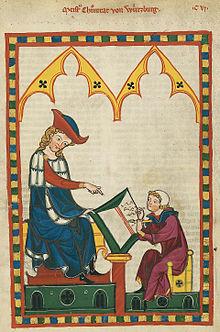Wikiversity students
|
This page has been moved to Wikiversity |

|
"Learning is the product of the activity of learners." -John Holt
Wikiversity Scholars
Wikiversity is devoted to active learners who are self-motivated explorers of the world we live in. Wikiversity does not strive to be a conventional university, but Wikiversity can trace its spirit of scholarship back to the origins of the modern university.
The word "university" is derived from the Latin “universitas”, which is short for "universitas magistrorum et scholarium", meaning roughly "community of masters and scholars". According to David C. Lindberg in his book "The beginnings of western science", "guild" is a good term to use to describe such a "community of masters and scholars". The idea of teachers and students banding together was part of the movement towards trades and crafts forming what came to be known as guilds.
When the first universities were formed, elementary education included language skills and basic mathematics. The entry level of university education eventually evolved into what we know as a liberal arts education. Originally, a typical age for starting participation in university education was about 14. Typical undergraduate topics were philosophy and "advanced" mathematics such as geometry. Students might typically learn astronomy and astrology according to Ptolemy. This is the level of education that is today found in American High Schools. It should be expected that as High School students mature cognitively and socially they will be able to participate in Wikiversity. Some more precocious students from pre-High School grades may also benefit from Wikiversity.
The Name
edit
Some people object to the name "Wikiversity". It has been suggested that the name "Wikiversity" is too centered on higher education and that the main Wikimedia educational project should also include content that is for less advanced students. In the "learning as collaboration" model of wiki-assisted learning, each student must take responsibility for their education and utilization of available online resources.
It is not clear that the youngest students can fully participate in an online learning experience in a wiki environment. Dull participation is not just "point, click, read". Developmental psychologists such as Erik Erikson have attempted to characterize stages in human cognitive development. In Piaget's theory of cognitive development, the capacity for abstract thinking and drawing conclusions from collections of information does not usually develop until after age 12. According to Erikson, children learn to interact constructively with peer groups during the period from age 12 to 18. It can also be argued that these are important social skills that need to be learned in the "real world" where all sensory modalities can be utilized, not under the restricted conditions of sensory deprivation that apply to online communities.
Wikiversity does include online educational resources for all grade levels. For young students, the use of such materials should probably be in a setting where they have direct contact with other people.
Where to start
editIf you like the idea of a learning environment where you are in control and you are free to learn about those topics that most interest you, then Wikiversity is for you. If you are looking for a quick answer to a question, try the Wikiversity:Helpdesk. If there is a conventional subject area that you want to explore, try browsing this Schools list. Wikiversity is built around learning projects. You might be able to match your interests to an existing project or start a new one.
See also
edit- Some of the material on this page came from the Collaboration Wikia.
| The U in Wikiversity (edit) |
|---|
| Find your place in the Wikiversity community |
| Education - Hunter-gatherers | Scholars | Browsers | Masters |
| Service - Wikipedia | Wikinews | Wikibooks |
| Research - secondary | original | collaboration |
| Other - Support staff | Student union | Faculty club |